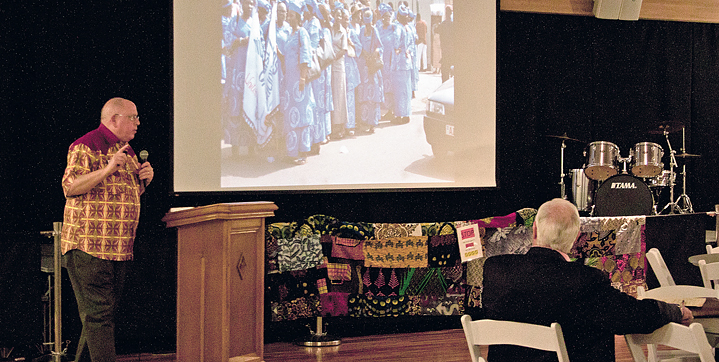People gathered in Wrightsville United Methodist Church Monday, Jan. 26 to hear General Board of Global Ministries missionary Kip Robinson speak about his mission work with his wife Nancy in the impoverished West African country of Sierra Leone.
The Robinsons recently returned from Freetown, Sierra Leone, where Kip provides engineering and project management assistance and Nancy works as a continuing education coordinator.
Lack of healthcare and education are the main issues with which the country is currently dealing, Kip Robinson said.
Sierra Leone spends only $13 per person per year for healthcare, he said, compared to the $3,200 per person spent by the United States. The region has endured outbreaks of malaria, typhoid and most recently, the Ebola virus.
“Sierra Leone was the first country threatened by Ebola because it was a long time before they actually had the will to do something about it,” Robinson said.
Part of Wrightsville United Methodist Church’s mission abroad is to help restore one of Sierra Leone’s medical facilities, Rotifunk Hospital. A civil war that broke out in 1990 destroyed much of the country’s infrastructure, including the hospital, so Wrightsville UMC partnered with the North Carolina Conference to create a five-year plan for rebuilding the facility.
Robinson said in addition to providing better healthcare, the missionaries want to help the citizens prevent the spread of disease. Funds raised by the United Methodist Church provided 600,000 mosquito nets to be distributed throughout the region to protect from malaria.
Following the Ebola outbreak, the international community also donated numerous ambulances to assist in transporting the country’s ill to receive medical care.
Lack of education is also prevalent. Sierra Leone has a 70 percent unemployment rate and 80 percent of the citizens are illiterate, Robinson said.
He also shared photos and described the experience of living in Sierra Leone. Freetown is very crowded, he said, and most of the buildings do not have running water or electricity.
“Driving conditions are horrible,” he added. “People walk down the streets and it takes an hour and a half to go eight miles.”
They eat two meals per day of fish or stew and do all their shopping in local markets, Robinson said.
“What you do for clothes is, Nancy will buy material and the dress is made for her, and if there’s any material left over I get a shirt,” he said.
They iron their clothes to keep flies from laying eggs in the fabric and keep an “Ebola bucket” containing water and disinfectant outside their house where visitors can wash their hands before entering.
One of the most pressing issues they encounter, Robinson said, is a lack of clean water.
“In our neighborhood there is a simple pipe but you never know when the water is coming on,” he said. “So in your family you would send the youngest child … and they would sit by the water tap and test it every so often. When the water is flowing he runs and tells your family.”
While the region was deemed unsafe for mission trips due to the Ebola crisis, Ebola deaths dropped during late December 2014, so Robinson said he hopes he and his wife will be able to return soon to continue their work.
email [email protected]




